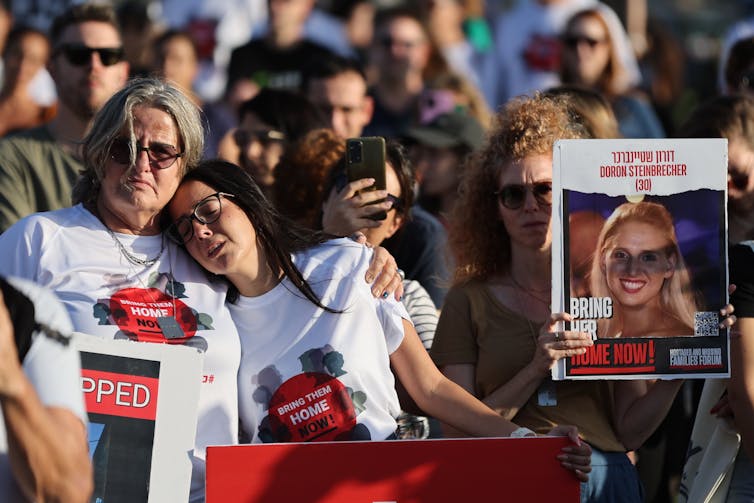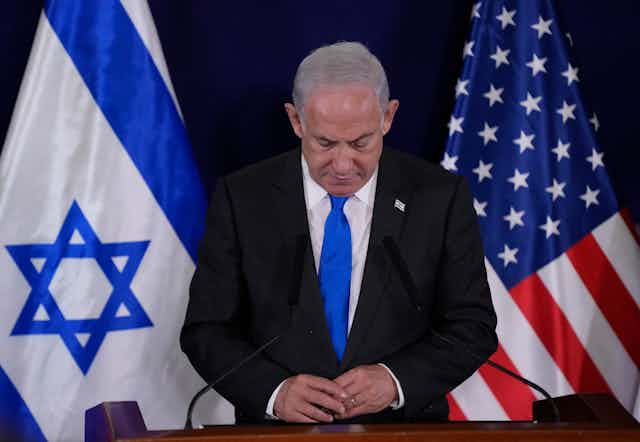More than five weeks into Israel’s war with Hamas, Prime Minister Benjamin Netanyahu has not outlined his future vision for Gaza.
He has said many times the war will continue until Hamas is eradicated. But his battle plan for achieving that objective is far from clear.
As calls grow louder around the world for a ceasefire, Israel is finding itself under increasing pressure to respond. This is placing more scrutiny on Netanyahu’s overall strategy for prosecuting the war – and what could happen after it’s over.
Constantly in the background of Israel’s military campaign is the fate of more than 200 hostages – Israelis and other nationals – held by Hamas. Netanyahu has said there will be no ceasefire until all the hostages are released. Hamas has responded that no hostages will be released in advance of a ceasefire.
Neither side shows signs of budging and Hamas has now suspended negotiations over hostage releases because of Israel’s siege of Al Shifa hospital, Gaza City’s main medical centre. Israel says a Hamas complex is hidden in tunnels underneath the hospital – a claim Hamas denies.
Most of Gaza’s population is now crowded into the southern part of the strip. Some of Hamas’ key leaders are likely hiding there, raising another pertinent question as the war drags on. How will the Israeli Defence Forces (IDF) succeed in their mission of eradicating Hamas if its operatives are hiding among civilians in such a crowded area? Netanyahu has given no public indication.

Read more: Benjamin Netanyahu's leadership is questioned even as Israelis rally round the flag
Growing US-Israeli frictions
With so many key questions left unanswered, there is a growing disconnect between Netanyahu and the Biden administration in the United States.
President Joe Biden and Secretary of State Antony Blinken have both said Israel should not reoccupy Gaza after the war. They have also indicated a preference for the Palestinian Authority, led by Mahmoud Abbas, to extend its authority to Gaza after Hamas’ removal.
By contrast, Netanyahu has said Israel will need to retain control over security in Gaza after the war.
Moreover, he has rejected the Palestinian Authority as a successor administration to Hamas for various reasons, including the fact it has not issued an unequivocal condemnation of Hamas’ attack on Israel.
Netanyahu’s balancing act
Netanyahu’s planning seems to be edging towards a demilitarised Gaza with IDF forces based outside the strip, ready to re-enter the enclave when any security threat to Israel is detected.
But he does not seem to be addressing the risk that a power vacuum following Hamas’ removal might be filled by another militant group, such as Palestinian Islamic Jihad, which would certainly not be to Israel’s liking.
Nor has he addressed the probability that disarming those Palestinians who are already radicalised will only be a partially effective exercise.
The problem with understanding Netanyahu’s thought process is that he is dealing with several imperatives simultaneously:
1) Appeasing hard-line members of his government
The coalition government he leads is the most right-wing in Israel’s history. Though the influence of extremists has been diluted by the addition of the centrist Benny Gantz to the war cabinet, Heritage Minister Amihai Eliyahu still suggested Israel might use a nuclear weapon against Gaza. He was repudiated by Netanyahu, but the comment was indicative of hardline sentiment that remains in the government.
After the war, Netanyahu doubtless hopes to resume governing with this coalition, so he must take their interests into account when it comes to formulating a post-war plan for Gaza.
2) Assuaging the anger of hostages’ families
The families are demanding Netanyahu prioritise negotiations to free their loved ones over the military campaign. Netanyahu claims he is prioritising both. But that claim has lost some cogency since reports emerged that Netanyahu rejected a deal for a five-day ceasefire early in the war in return for release of some of the hostages.

3) Securing his own political future
Netanyahu will be acutely aware that the only other Israeli political leader to have presided over a security and intelligence failure of the magnitude of Hamas’ October 7 attack was Golda Meir at the start of the Yom Kippur War in 1973. And she resigned soon after the Egyptian and Syrian forces were defeated.
The longer the current war continues, the greater the chance Netanyahu can severely diminish Hamas’ leadership structure. And this would allow him to burnish his tarnished credentials as Israel’s security guarantor.
He will also have noted former Prime Minister Ehud Barak’s comment that Israel probably has only weeks left to eliminate Hamas before international public opinion completely turns against Israel. This adds urgency to Netanyahu’s need for an outcome he can describe as a victory.
4) Dealing with pressures from the White House
The Biden administration is also letting it be known through media leaks that it has concerns over Israel’s conduct of the war, particularly the high number of civilian casualties and apparent lack of an exit strategy. The US is also warning Israel more explicitly that international support for its military operation is waning.
This is of growing concern to the Biden administration because its strong support for Israel comes with increasing risks. First, American diplomats have said anger in the Arab world is so intense over continued US support for Israel, it is “losing us Arab publics for a generation”.
And there is also the risk Biden’s embrace of Israel could hurt him during next year’s presidential election. Many of the anti-war demonstrators in the US are young, college-educated progressives who helped elect Biden in 2020. If these voters fail to turn out for him next year, the likely Republican candidate, Donald Trump, could prevail.
Reaching an acceptable – and achievable – endgame
Biden and Netanyahu are thus on a collision course. Netanyahu wants a long war in order to maximise his chances of eliminating Hamas – and to delay the inevitable post-war reckoning over the Israeli security failure that led to so much carnage on October 7.
Biden agrees Hamas has to be destroyed, but he needs the war to be as short as possible in order to limit the blow-back against US interests internationally, as well as against him domestically.
There is also uncertainty about the amount of purchase Biden might have if he attempts to rein in Netanyahu. That uncertainty is compounded by the question of what might be an acceptable – and achievable – endgame in Gaza for both.

